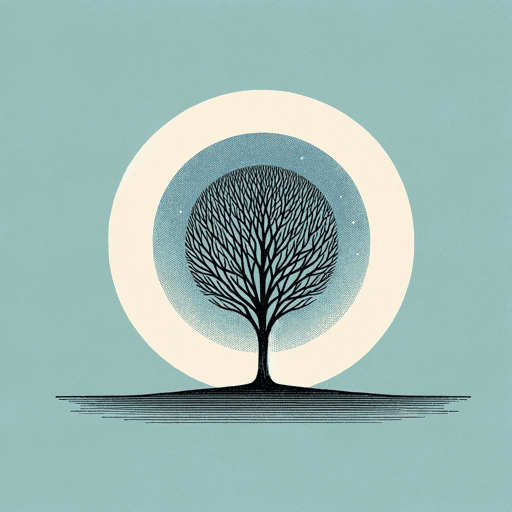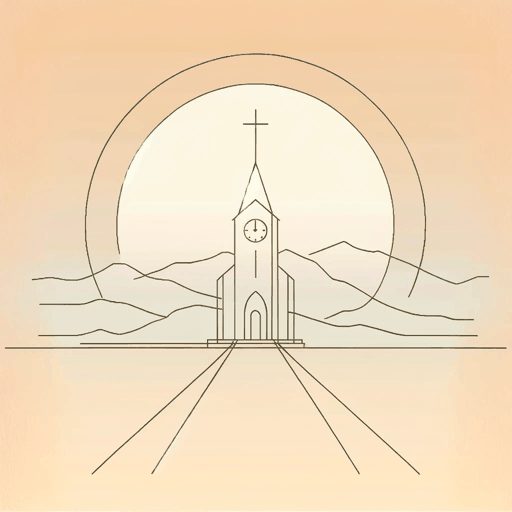17 pages • 34 minutes read
Dana GioiaEntrance
Fiction | Poem | Adult | Published in 2001A modern alternative to SparkNotes and CliffsNotes, SuperSummary offers high-quality Study Guides with detailed chapter summaries and analysis of major themes, characters, and more.
Summary and Study Guide
Overview
“Entrance” is an English translation of a short lyric poem written in German by Rainer Maria Rilke, one of the most prominent of 20th-century poets. It was published in July 1902 in Rilke’s The Book of Pictures (Das Buch der Bilder, sometimes translated as The Book of Images). This was Rilke’s first collection of poetry, published when he was 26 years old and containing poetry written over the period 1898-1901. The title in German is “Eingang.” It is a poem about the creative act and about seeing the world in a way that is fresh and new, uncluttered by old habits. Over the years the poem has had many translators, including C. F. MacIntyre, Robert Bly, Edward Snow, and Dana Gioia. It is Gioia’s version, published in 2001, that will be used for this study guide. Gioia is an American poet in his own right, and his version of the poem appeared in his third collection, Interrogations at Noon.
Poet Biography
Rainer Maria Rilke was born on December 4, 1875 in Prague, in Bohemia, which was part of the Austro-Hungarian Empire. He was the son of Josef, a railroad official, and Sophie Rilke. Rilke’s parents divorced in 1884, and Rilke attended a military school from 1886 to 1891 and a trade school in Linz for a year after that. He showed little interest in business, however, and in 1895 he entered the Karl-Ferdinand University in Prague to study philosophy. He briefly switched to law studies before moving to Munich in September 1896 to study art history.
By this time Rilke was already writing poetry, essays, and plays. In Munich, he formed a close relationship with the writer and critic Lou Andreas Salomé. Between 1897 and 1900, Rilke traveled to Italy and Russia, where he met Leo Tolstoy. In 1901, he married the sculptor Clara Westhoff, and that year they had a daughter, Ruth. They lived in Westerwede near Bremen, Germany, but financial troubles resulted in Rilke leaving for Paris in August 1902; he had been commissioned to write a monograph on the sculptor Auguste Rodin. It was also in 1902 that the first work of Rilke’s maturity appeared. This was The Book of Pictures (Das Buch der Bilder), which contained “Eingang” (“Entrance”). It was followed in 1905 by The Book of Hours (Das Stundenbuch). New Poems, First Part appeared in 1907 and New Poems, Second Part, in 1908.
Rilke was always a traveler, and between 1910 and 1912 he visited North Africa, Spain, and other places in Europe. In 1910, his only novel The Notebooks of Malte Laurids Brigge, was published. World War I broke out in August 1914, and the following year Rilke was drafted into the Austrian Army. He served in a government office in Vienna and was discharged a year later. After the war, Rilke became a citizen of the newly created state of Czechoslovakia. In 1921, he settled in Switzerland at the Castle Muzot near the village of Sierre. There he completed the ten Duino Elegies (Duineser Elegien), which he had begun in 1912. The elegies are often considered to be his finest work. Rilke also wrote the 55 poems that constitute the Sonnets to Orpheus (Sonnette an Orpheus) in 1923.
Rilke died of leukemia on December 29, 1926 at the age of 51 in Valmont sur Territet, Switzerland.
Poem Text
Whoever you are: step out of doors tonight,
Out of the room that lets you feel secure.
Infinity is open to your sight.
Whoever you are.
With eyes that have forgotten how to see
From viewing things already too well-known,
Lift up into the dark a huge, black tree
And put it in the heavens: tall, alone.
And you have made the world and all you see.
It ripens like the words still in your mouth.
And when at last you comprehend its truth,
Then close your eyes and gently set it free.
Rilke, Raine Maria. “Entrance.” Translated by Dana Gioia. DanaGioia.com.
Summary
“Entrance” is a 12-line poem divided into three quatrains. In the first line, the poet addresses the reader directly. He invites them to go out that night, leaving the security of the home behind. Having done so, the person’s vision will become hugely expanded, the poet states in Line 3. Line 4 repeats the beginning of the first line, reemphasizing that the poet has no specific reader or audience in mind for his words. It does not matter who they are. In Line 5, the first line of the second quatrain, the poet asks the reader, whose eyes have become dull and habituated by always looking at familiar things, to mentally introduce in the darkness a large black tree (Line 7) and place it (that is, imagine it) high in the sky, standing just by itself (Line 8). The final quatrain (Lines 9-12) reflects on what the person has now done. He or she has created their own world and everything in it by an act of the creative imagination. It will continue to grow, the poet says, like the person’s words that have created it and go on creating it (Line 10). Once the person understands the process, the poet says they should close their eyes and let go of the image and word(s) they have created. This will free the word or image and, it is implied, allow the creative process to continue.


